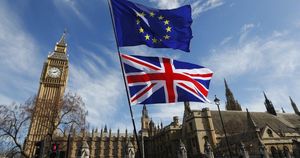President-elect Donald Trump’s nomination of Pete Hegseth to lead the Department of Defense is stirring significant controversy. Hegseth, a well-known Fox News personality and Army National Guard combat veteran, has been accused of sexual assault stemming from a 2017 incident during the California Federation of Republican Women’s conference. This allegation, which was brought to light following the nomination, poses questions about his suitability for overseeing the military.
The alleged assault took place at the Hyatt Regency Monterey Hotel and Spa, where various Republican events were conducted. According to reports from various media outlets, including The Daily Beast and the Washington Post, the victim, whose identity has not been disclosed, filed the complaint days after the incident, claiming to have sustained bruises during the encounter. Although the police investigated the matter, no charges were filed against Hegseth, and the full police report has not been made available to the public. Hegseth has denied any wrongdoing, asserting the encounter was consensual and stemming from confusion around the situation.
Reports indicate Hegseth even made a payment to the accuser out of fear of losing his job at Fox News. Timothy Parlatore, Hegseth's attorney, confirmed this payment but insisted it was not to admit guilt, stating, "These allegations were fully investigated, and Mr. Hegseth was cleared of any wrongdoing." Meanwhile, statements from Trump’s team assert their confidence in Hegseth as he embarks on what they describe as groundbreaking leadership for the Pentagon.
Hegseth's nomination has sparked not only alarm over the sexual assault allegations but also concerns over his lack of traditional military experience for such a high-profile position. Critics have pointed out Hegseth's background as inadequate, having mainly been recognized for his media persona rather than significant military command. Discussions within defense circles reflect shock at Trump's choice, emphasizing the unconventional nature of this nomination for such a pivotal role overseeing military operations and the defense budget.
There’re also heightened concerns following alarming findings about extremism within the ranks of the U.S. military. Hegseth previously downplayed the seriousness of extremist behavior among military members and opposed Pentagon measures to curb this troubling trend. His calls to dismiss concerns about extremists reflect broader issues within military and political spheres as the nation grapples with the repercussions of the January 6th Capitol riot, during which numerous individuals with military connections were implicated.
Hegseth has openly criticized the military's focus on rooting out extremist elements and even supported accused soldiers of war crimes, raising eyebrows about how he might approach leadership should he assume office. Comments he made on air about how “people who love our country” led the January 6th protests conflict sharply with the narrative of rebellion supported by the military establishment. This tension between Hegseth’s views and established military leadership raises questions on how he would prioritize the safety and integrity of the armed forces.
Trump’s transition team reportedly expressed concern about these allegations and attempted to manage the fallout post-announcement, indicating this is not merely about one man’s qualifications but touches upon broader systemic issues. Hegseth’s infamous statements and beliefs—including his past comments against diversity initiatives within the military—further complicate his potential confirmation. His outspoken views on various issues have garnered both fervent supporters and vehement detractors.
During this nomination process, the military has seen itself at the heart of political debates, with the emergence of candidates like Hegseth heightening discussions around loyalty, integrity, and the very definition of patriotism. What the final outcome of Hegseth’s nomination will be remains to be seen, but both his critics and supporters are poised for what could be intense scrutiny during the upcoming confirmation hearings.
With the backdrop of increased awareness and concern for sexual assault incidents within the military, Hegseth’s confirmation hearings are set to be contentious. His previous statements about women serving alongside men and criticisms about any perceived weakness within military policies are expected to be put under the microscope even more harshly than before.
Should he take his position within the Defense Department, it’s yet to be determined how he would influence policies on diversity and inclusivity within military ranks—and whether these values would be at odds with what the current administration aims to enact.
Trump’s administration is undoubtedly facing scrutiny on multiple fronts, and the fallout from this unexpected nomination is likely to extend well beyond the confirmation hearings. For now, Hegseth finds himself at the intersection of military leadership, sexual assault allegations, and the broader conversation about extremism within the U.S. armed services—factors pulling the weight of Washington’s attention as the political scene gears up for another powerful administration.



